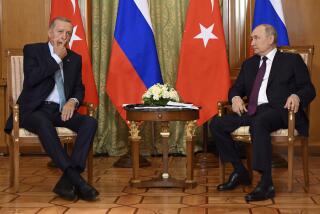U.S.-Soviet Grain Accord Expected This Week : Agriculture: The new pact should be much the same as the present one and last five years.
- Share via
VIENNA — U.S. trade negotiator Julius Katz said Sunday that the U.S.-Soviet grain trade pact that he hoped to finish this week would closely resemble the current agreement and probably last for five years.
“It won’t be very different,” Katz said in a telephone interview. “There may be some alteration of the quantities, but it won’t be very different.”
U.S. and Soviet negotiators will begin the second round of negotiations on renewing the long-term grain agreement Wednesday. Talks are expected to last through Thursday.
The first round was held in Moscow in December.
The grain talks will be preceded by two days of bilateral negotiations on a broader trade agreement that is expected to be concluded in time for a June superpower summit.
Katz, deputy U.S. trade representative and head of the U.S. negotiating team at both sets of talks, said very little divided the two sides in the grain discussions.
“As far as I am concerned, we could do it in a couple of hours,” Katz said.
But the final pact will probably not be signed until President George Bush and Soviet President Mikhail Gorbachev meet in June, and another round might be needed, he said.
“There are potentially some issues that could require a final round,” he said. The existing accord was signed in 1983 and renewed in 1988.
Under the current agreement, which expires at the end of the year, Moscow pledged to buy at least 4 million tons each of wheat and corn, plus 1 million tons of wheat, corn, soybeans or soy meal annually.
In addition, Moscow is required to consult Washington before buying more than 12 million tons of wheat and corn in a year.
As of March 8, the Soviet Union, the world’s largest grain importer, had bought 11 million tons of U.S. corn and 2.8 million tons of wheat in the marketing year that began Oct. 1.
It had also bought 1.2 million tons of soybeans and soy meal from the United States, the world’s largest grain exporter.
Last December, Moscow asked that the annual minimum level of purchases be cut to 6 million tons, but the United States said it could not accept anything lower than 9 million.
In addition, Moscow asked that the 12-million-ton buying cap be raised.
More to Read
Sign up for Essential California
The most important California stories and recommendations in your inbox every morning.
You may occasionally receive promotional content from the Los Angeles Times.










